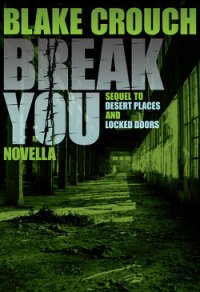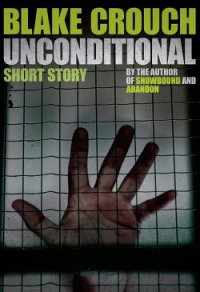Locked Doors - Crouch Blake (книги серия книги читать бесплатно полностью txt) 📗
The man with long black hair looked over his shoulder and smiled.
“Be right with you, Karen.”
When he turned and stood she saw that he held a noose by its coil.
He came forward as she tried to crawl the other way and slipped the noose around her neck. Then he hoisted her up over his shoulder and set her down on top of the railing facing him.
Unable to muster a scream, Karen glanced over her shoulder, felt a needling in her stomach. Far below she saw the adjoining oil room at the granite foundation of the lighthouse. She saw the roof of the nearby Keeper’s Quarters and the visitor parking lot. Westward beyond the marsh, she took in the waters of the Pamlico Sound and further on, the blinking red lights of radio towers on the mainland.
“This is a black and white banded lighthouse,” the man said. “I’ve measured out the rope so you’ll hang in the middle white band facing the visitor’s center. Imagine the face of whoever finds you first. Maybe some minivan family from the Midwest, with lots of little ones.”
He laughed.
Karen looked at the skein of climbing rope at his feet and the bulky knot he’d tied to the railing. He held her by the waist belt of the bathrobe she’d worn since her abduction.
She sought out reason in his eyes and found it. They were not wild or impassioned but black and serene. And if they burned, it was a smoldering like embers.
Now only clutching her with one hand, he brushed his black hair from his eyes.
Karen felt gravity pining for her, a waterless undertow.
She upchucked on his windbreaker but he did not let go.
“Karen,” he said. “Now do you believe?”
He released the belt of her robe, watched her fall.
She screamed for two seconds, then the rope silenced her.
Back and forth she swung, still fifty feet above the lawn, a pendulum for the lighthouse.
19
AT two in the morning the Impala streaks south on Ocracoke Island, a ribbon of land less than a half mile wide. To the west the Pamlico Sound yawns out into darkness. Oceanside the Atlantic shines like black blood under the jaundiced October moon.
In the trunk, Elizabeth Lancing sleeps and she does not dream.
Behind the wheel the smiling driver is tired and happy, the window down, his hair whipping across his pale face. He inhales deeply, the tepid air redolent of kelp and saltwater and driftwood and the carcasses of fish on tidesmoothed sand.
At last he sees it beyond the dunes that now hide the sea—his hometown, a faint incandescence on the black horizon.
And he wonders, Old Andrew, since I’ve shown you the way, will you come?
V I O L E T
20
THE last Wednesday of each month is unfailingly baked spaghetti night at Lighthouse Baptist Church. It is tradition, a comforting inevitability for this Christian community.
The congregation slowly progressed from the kitchen into the fellowship hall much as it had done every Wednesday evening for the past twenty-two years. Each churchgoer carried a paper plate laden with baked spaghetti, a yeast roll, a salad of wet lettuce and shredded carrots, and a Styrofoam cup of sweet tea.
They dined with their brothers and sisters in Christ at the circular foldaway tables, happily consuming the insipid meals, the fellowship hall resounding with myriad conversations and rampant children, while praise music flowed from speakers on the stage, an auditory warmth. Through tall windows the dying sun funneled weaker and weaker, now only a suggestion of purple in the late October sky.
Violet King sat at a table with her parents, Ebert and Evelyn, and a friend of her parents named Charles. Charles was thirty, single, and on fire for Jesus. Violet disliked the way he looked at and spoke to her, as though he were privy to some secret she had not disclosed, as though he were something more than a shallow acquaintance.
Charles had been monopolizing the conversation for the last five minutes, narrating his attempt to witness to a “troubled black youth.”
But Violet wasn’t listening. She just stared at the cube of baked spaghetti on her plate.
“…and I told him, ‘Jesus died for you, little fella.’” Charles’s bottom lip had begun to quiver, his voice gone soft and earnest with emotion. “And you know what he said to me? It’ll break your heart, Ebert. He said ‘How come God loves me?’ And I told him, I said… You with me, Violet?”
Violet looked up into those small lonely eyes across the table.
“Yes, I’m with you, Charles.”
“I told him, ‘God loves little black boys just as much as He loves little white boys.’”
A four-year-old boy ran over and stopped in front of Violet, a chocolate icing ring around his smiling little mouth.
“You’re pretty,” he said, then ran away shouting, “I did it, guys! I did it!”
The young woman laughed.
“Where’s Max, Violet?” Charles asked.
“Same place he was when you asked me a week ago,” Violet responded but she did not say it bitterly. “He’s coaching cross-country this fall. They had another meet today.”
Is that all right with you you freaking weirdo?
“Just don’t want to see him backsliding on us. You start skipping Wednesday nights, what’s next?”
“My son-in-law ain’t no backslider, Charles,” Ebert said. “You know I wouldn’t tolerate that. Ain’t that right, baby?”
“Yes, Daddy.”
Violet smiled at her father, a big brawny man, whitebearded and baldheaded. He’d earned that shiny red dome working his dairy farm. Their table smelled faintly of manure.
As Violet sipped her tea she felt Charles eyeing her. She often caught him staring, especially during Sunday sermons. He was always chiding her about her “boy haircut,” said women were supposed to have long and flowing hair, encouraged Violet to let her blond locks grow out.
Her pager buzzed against her hip and she glanced down at her lavender skirt.
When she saw the number she stood up.
“Mom, if Max comes, tell him I’ll be right back.”
“Everything all right, Vi?”
Evelyn stared up at Violet through cloudyblue eyes that picked up the gray in her hair.
How can you sit here with this whacko? “Yes ma’am.”
Violet walked out of the fellowship hall into the corridor of classrooms. At the end of the hallway, the double doors had been thrown open and she could see into the new sanctuary where the music director was furiously arranging chairs in the choir loft in preparation of the practice that would immediately follow the fellowship dinner. She didn’t feel up to singing tonight. She wanted to go home, crawl into bed with a pint of Cherry Garcia, and watch television, preferably a Ken Burns documentary on PBS.
With the commotion of the feasting congregation now a whisper, Violet stepped into a dark classroom and closed the door behind her.
The pager vibrated again.
She rummaged her purse for the cell phone.
21
VIOLET turned around in the cul-de-sac and parked her Jeep Cherokee on the curb. The dashboard clock read 7:15. There was no tinge of luminosity in the sky excepting the blurry pinpoints of starlight that obscured when you looked straight at them. Turning off the engine, she stared at the chaos in the distance, filtering out the dazzle of flashing lights so she could imagine this hysterical street as it must’ve seemed that night.




